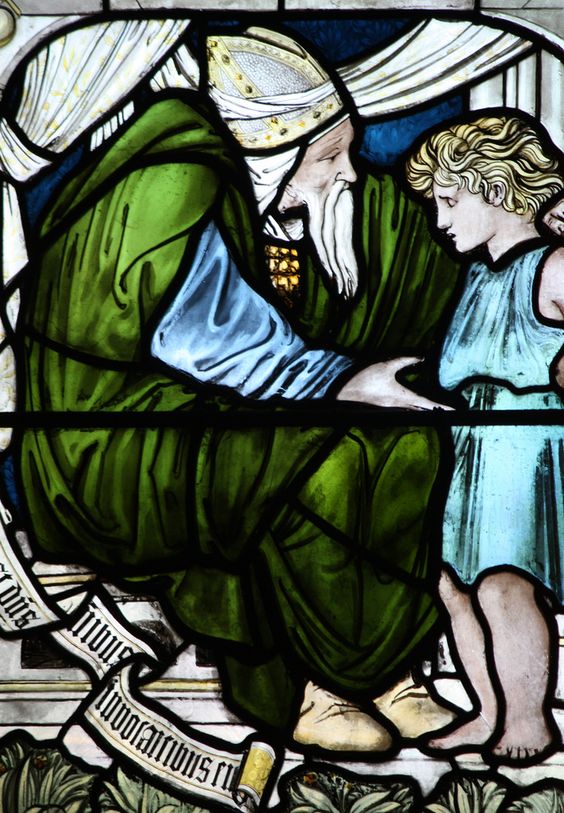Chapter Talk – Second Sunday of the Year – January 17, 2021, cycle-B
The theme of ‘call’ is the focus of the readings for this Second Sunday in Ordinary Time. The ‘call’ of God: how do we ‘know’ God is calling us? What are the signs and movement of the heart that reveal this call? We have the story of young Samuel’s call by God. It seems God is calling simply through the name: ‘Samuel, Samuel, Samuel’ (1 Sam 3:4). To hear our name being called, out of the silent depths of the heart, is an awakening moment, a divine moment in time, an in-breaking of God, asking us to listen. Samuel is being educated in listening by Eli, the priest. The final time the Lord calls Samuel, he follows Eli’s advice and responds: ‘Speak Lord your servant is listening’ (1 Sam 3:9). Does not God call all the time? Are we not still learners in having ‘the ear of our heart’ educated, educated in this growing process of listening? Do we ever hear our name being called in the silence of prayer: ‘Kathy, Kathy’? Or, ‘Kathy, Kathy, where are you?’ Such ‘calls’ from God are always invitations…invitations to change an attitude, invitations to wake us up, invitations to love more, invitations to change a behavior or a murmuring heart, invitations to deepen our relationship with God.
Another ‘call’ to ponder is Mary’s call at the Annunciation. In commenting on Rosetti’s mid- nineteenth century painting, the writer, Enuma Okoro, gives a profound description of Mary’s call and subsequent consent. She writes: “All holy encounters necessarily find us on the cusp of change, because to permit an audience to the sacred must always leave one irreversibly altered. And this is the ongoing invitation…: to stay open, even if we are uncertain of what exactly is trying to break into the mundanity of our daily lives”. Mary’s encounter with the messenger of God was life changing. Her openness was remarkable given all the uncertainty surrounding her consent. At the heart of any calling means ‘change’ in our lives…, a breaking in of God into our ordinary, everyday lives. We, of course, do not see where our consent will lead throughout our lives and all that we will encounter. However, we do witness Mary’s journey, and, yes, it is a journey of faith leading her eventually to standing by the cross of her Son.
In turning to the gospel from St. John we hear Jesus ask this question of Andrew and John: “What are you looking for?” (Jn 1:38). Questions from the Divine are also ‘calls’, calls to change, to wake up, to help us find and fulfill our vocation, ultimately, to help us fulfill our lives.…They are eternal questions in that they exist beyond time and space, and they come with the Divine intent seeking to expand the present horizon of our hearts. ‘What are you looking for’ is a question that unveils our desires, our deepest desires. The first two would be disciples are taken back by Jesus’ question to them…Their answer to Jesus may strike us as a little strange: They say, ‘Master where do you live’? He replies: ‘Come and see’ (Jn 1:39)…and they go…they abide and dwell…this abiding and dwelling with Jesus opens them up enough to know that they will continue their journey with Jesus, their consent makes them followers and eventually apostles. They begin a process of becoming true followers, a process of learning, of suffering and of authentic joy.
There is the vocational call where we come to know that this is my path, this is how I am to serve God and humanity. Then, there is God calling daily: both co-exist, they belong together….We each have heard the vocational call and are here living our vocation in monastic life, which is one profound way of living the gospel. Let us not forget, however, these daily Divine invitations. The Latin root word for ‘vocation’ is ‘vocare’ which means ‘call’. In salvation history, “humankind was called to be God’s partner” (The New Dictionary of Catholic Spirituality, p. 1009). This partnership is expressed in the covenantal relationship between God and humanity: cocreators and partners…. “Men and women are to be reminded of their fundamental vocation: responsible cocreation and fidelity to a covenant of love with their Creator” (p.1010). Can we see our lives in this more generic sense? In other words, our whole lives are a ‘vocation’, a living of the covenantal relationship with God…all our choices and actions come out of being a living witness of God’s daily calling to us. We are being called daily, by name, or by the Divine question, ultimately, we are called by God’s desire for relationship. ‘If today you hear God’s voice’ (Ps 94:8) this ‘today’ is every day. To hear God’s voice and calling and to respond is how we work out our salvation (Phil 2:12); it is how we grow in freedom, it is how our lives in the end become fulfilled.
Like young Samuel we say daily: ‘Here I am Lord, your servant is listening’. Or, like Mary, we say daily: ‘I am your servant. Let it be to me according to your Word’ (Lk 1:38). Like the first disciples: we take to heart the question: ‘What are you looking for’? All our lesser desires fall away as we become aware of the essential desire of our hearts: relationship with Christ, to live his gospel, to incarnate his healing Word of love, forgiveness, mercy.
Sr. Kathy DeVico, Abbess


